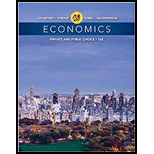
Illiquid assets and rank them from most liquid to illiquid.
Explanation of Solution
The liquidity of an asset refers to its ease and quickness in converting itself into cash without any significant loss in value. Cash in hand, cash at bank, short-term investments, high grade bonds, and stocks are some of the examples of liquid assets.
On the other hand, illiquid assets cannot be converted easily and quickly into cash without any loss in the value. Assets such as land, houses, a family-owned business, business equipment, and artistic works are some of the examples of illiquid assts.
Liquid asset: A liquid asset refers to the asset that can be converted easily and quickly into cash without any significant loss of value.
Illiquid asset: An illiquid asset refers to the asset that cannot be converted easily and quickly into cash without any loss of value.
Want to see more full solutions like this?
Chapter 13 Solutions
Economics: Private and Public Choice (MindTap Course List)
- How can a bank end up with negative net worth?arrow_forwardConsider the relative liquidity of the following assets: Assets 1. A bond issued by a publicly traded company 2. The funds in a savings account 3. A $1 bill 4. Your condo Select the assets in order of their liquidity, from most liquid to least liquid. Most Liquid Second-Most Liquid Third-Most Liquid Least Liquid Assetarrow_forwardWhich of the following assets in the U.S. would be considered the least liquid? A silver coin An antique automobile A certificate of deposit (CD) A U.S. savings bondarrow_forward
- Stealth bank holds deposits of $593million. It holds reserves of $30 million and government bonds worth $80 million. The current market value of the bank's loans is $400 million. What is the value of the bank’s total liabilities? (Put your answer in terms of millions. If you think it should be 550 million, then write 550 not 550,000,000)arrow_forwardOne reason why cryptocurrency is not considered money by many is that it is not considered to be a __________________ __________________ __________________.arrow_forwardAs part of the wave of “deregulation” of financial markets in the 1980s, banking laws were changed to allow commercial banks in the United States to offer relatively liquid savings accounts that could pay a market interest rate. What were these accounts called? How did they work?arrow_forward
- Lamar invests in an institution that does not make loans but is regulated by the Security and Exchange Commission, has high management fees, and invests in risky assets like currency swaps. What kind of institution did Lamar invest in? Select one: a. Hedge Funds b. Cryptocurrency c. Commercial Bank. d. Credit Union e. Investment Bankarrow_forwardNot sure how to solvearrow_forwardWhat is Money? What makes it useful? Explain its primary and derivative functions of Money? (1000 words)arrow_forward
- Stealth bank has deposits of $700 million. It holds reserves of $10 million and has purchased government bonds worth $300 million. The banks loans, if sold at current market value, would be worth $600 million. What is the total value of Stealth bank's assets? [REMEMBER TO INCLUDE THE CORRECT NUMBR OF ZEROS IN YOUR ANSWER].arrow_forward34. Bankers have a reputation for conservatism in politics, dress, and business affairs. Is there an economic rationale for this conservatism? Explain.arrow_forwardExplain in details on the services provided by investment bank as an underwriter.arrow_forward
 Macroeconomics: Private and Public Choice (MindTa...EconomicsISBN:9781305506756Author:James D. Gwartney, Richard L. Stroup, Russell S. Sobel, David A. MacphersonPublisher:Cengage Learning
Macroeconomics: Private and Public Choice (MindTa...EconomicsISBN:9781305506756Author:James D. Gwartney, Richard L. Stroup, Russell S. Sobel, David A. MacphersonPublisher:Cengage Learning Economics: Private and Public Choice (MindTap Cou...EconomicsISBN:9781305506725Author:James D. Gwartney, Richard L. Stroup, Russell S. Sobel, David A. MacphersonPublisher:Cengage Learning
Economics: Private and Public Choice (MindTap Cou...EconomicsISBN:9781305506725Author:James D. Gwartney, Richard L. Stroup, Russell S. Sobel, David A. MacphersonPublisher:Cengage Learning Exploring EconomicsEconomicsISBN:9781544336329Author:Robert L. SextonPublisher:SAGE Publications, Inc
Exploring EconomicsEconomicsISBN:9781544336329Author:Robert L. SextonPublisher:SAGE Publications, Inc
 Economics (MindTap Course List)EconomicsISBN:9781337617383Author:Roger A. ArnoldPublisher:Cengage Learning
Economics (MindTap Course List)EconomicsISBN:9781337617383Author:Roger A. ArnoldPublisher:Cengage Learning





